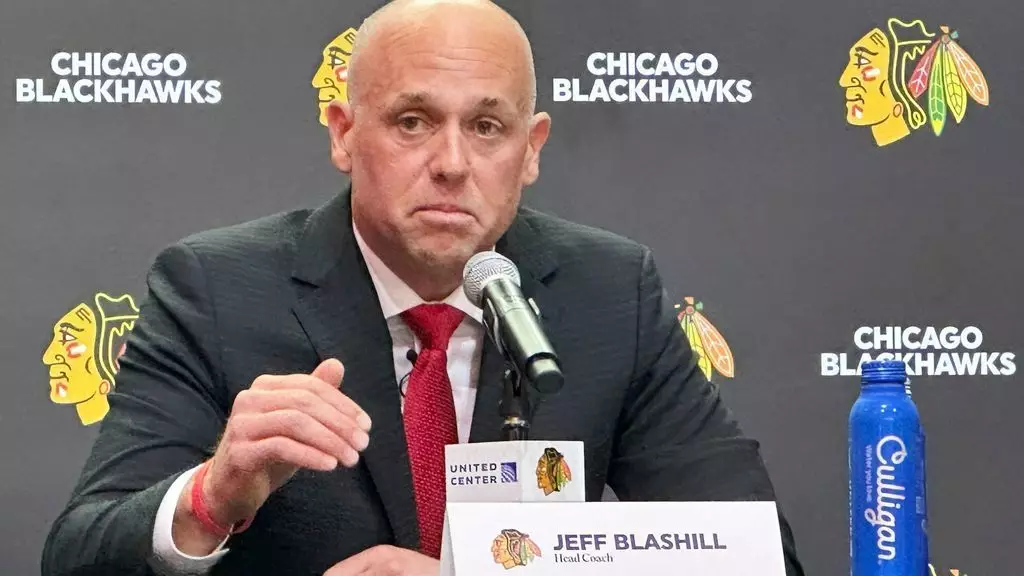The Chicago Blackhawks’ latest training camp launch signals a renewed focus on discipline, resilience, and fundamental development, rather than complacency. Under Jeff Blashill’s leadership, the team’s initial days have been anything but gentle. From the outset, the intensity on the ice has been palpable, reminiscent of a team in transition rather than a roster resting on past laurels. This approach underscores a clear strategic pivot: transforming the culture of a historically successful franchise into one rooted in grit, relentless effort, and strategic discipline. The message is loud and clear—nothing will be handed to these young players, especially those like Connor Bedard, who bear the heavy weight of expectations and hope.
Blashill’s detailed involvement, almost relentless in his on-ice directives, reflects his conviction that success isn’t built overnight. His visibly taxing day — mentioning sore feet after months off — is emblematic of a coach determined to instill a new work ethic in an organization eager for a renaissance. Such an intense start is critical; it’s a declaration that the Blackhawks are no longer satisfied with surface-level improvements. Instead, they want foundational change, rooted in a culture of unwavering dedication. In this context, the first few days of camp aren’t merely about skating or drills; they are about embedding a mindset that sacrifices comfort for greatness.
Building Through Turmoil and Youth
The Blackhawks enter the 2023-24 season as one of the most youthful teams in the league. The emphasis isn’t solely on immediate results but on long-term construction. With an average roster age far below league norms, the challenge for Blashill is monumental: nurturing talent while establishing stability and identity. It’s a balancing act akin to teaching a rookie to skate on thin ice while simultaneously encouraging resilience and confidence.
While veteran leadership like captain Nick Foligno might serve as a stabilizing influence, the primary reliance is on developing young stars. Connor Bedard exemplifies this mission—young, gifted, and burdened with the hopes of a franchise. His acknowledgment of the strenuous training sessions highlights a level of maturity and receptiveness essential for young players to evolve. The Blackhawks’ approach doesn’t romanticize talent alone; it insists on forging resilience, a trait often lacking in freshly assembled rosters. It’s a conscious bet that emphasizing fundamentals and a disciplined culture will convert raw potential into tangible success.
Strategic Challenges and Opportunities
Blashill’s previous experience with Detroit and Tampa Bay has laid a foundation, but guiding this rebuilding process offers unique lessons. His acknowledgment that the current situation bears similarities to the American Hockey League era reveals an understanding that patience, perseverance, and process are paramount. Success, he suggests, hinges on consistent effort and instilling habits aligned with winning.
Yet, obstacles loom large. The absence of veteran goaltender Laurent Brossoit due to injuries adds a layer of uncertainty to the team’s defensive core. While the trade for Spencer Knight and the emergence of Arvid Soderblom offer some reassurance, the goaltending depth remains in flux—a potential Achilles’ heel if not managed diligently. This signals that even in the early stages of rebuilding, strategic acquisitions and player development are pivotal.
Blashill’s challenge is to cultivate a resilient mental framework in his players, especially in the face of setbacks and long-term injuries. This process isn’t merely about tactical adjustments but about fostering an environment where grit and mental toughness become the currency of success. The Blackhawks have an arduous road ahead, but this deliberate, disciplined approach could lay the groundwork for resurgence—not just in the standings but in the identity of the franchise itself.
The Future Is Young, but Promising
Despite the inherent chaos and the steep learning curve, the Blackhawks’ strategy is fundamentally optimistic. They are betting on the idea that a culture rooted in hard work, combined with the raw talent of their young core, can catalyze a turnaround. That their new coach is unafraid to push limits from day one indicates a long-term vision — one where patience and relentless effort override quick fixes.
This approach may result in a difficult season in terms of wins and losses, but it offers tangible hope for sustainable growth. Blashill’s emphasis on winning fundamentals isn’t just about game strategy; it’s about forging characters. If the team can embrace this mindset, they might emerge from their rebuilding phase not merely improved but transformed—ready to compete not just with skill but with steel in their spine. The next phase for the Blackhawks is as much about internal development as external results, and that could prove to be their greatest victory in the years to come.


Leave a Reply